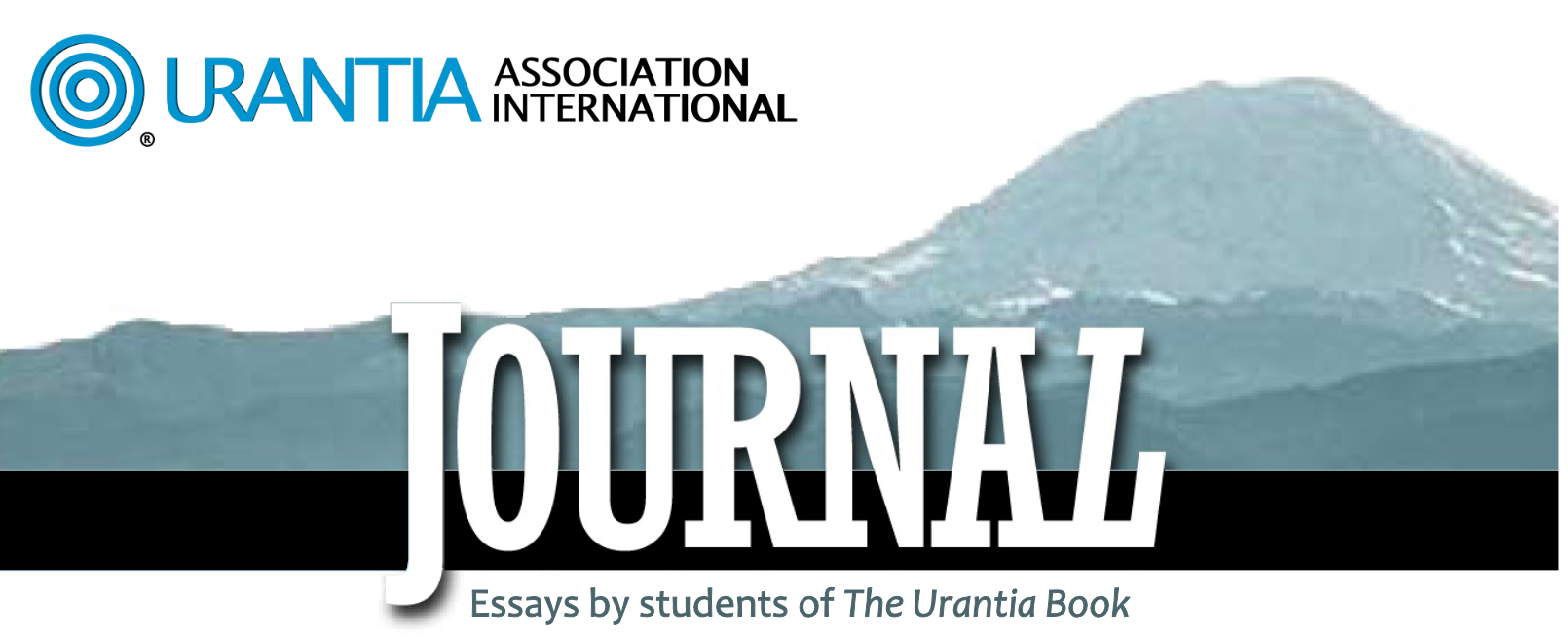Journal – May 2021
|
In This Issue
|
Welcome to the May 2021 edition of the Urantia Association's Journal, a publication dedicated to the thoughts, observations, and experiences of Urantia Book students from around the world. This edition offers a broad scope of ideas and reflections, including spiritual insights gained from personal tribulations, approaches to worship and service, tactful ideas for spreading the good news, and novel ways to introduce the ideals and ideas of The Urantia Book to younger generations.
Our first article, No Appointments, No Disappointments: Adversity and the Authentic Self, is a moving and thoughtful piece by Christopher Ross, who describes his tragic experience with a partner who was a spiritual seeker like himself but who could not find happiness in his own life. This sad event inspired him to closely examine his "authentic self" as well as "the mission of adversity and the spiritual value of disappointment" that God and his angels present to all of us in the course of our lives. How we deal with such problems, he concludes, is not by intellect alone but by a daily devotion of oneself to conscious union with God.
The second article, Making Worship and Service the Center of Our Lives by Kathleen Swadling, takes a close look at how we internalize concepts of worship and service, as well as how we can incorporate a meaningful, daily practice of worship and service in our lives. She reminds us of the central role worship plays in any spiritual progress, "worship is really the fountain head, the fundamental premise from which everything else of spiritual value springs." In particular, Kathleen stresses the point that our relationship with our Father is like any relationship of love; you have to work at it. And this work includes not only worship but also an attitude of sincerity, making the right choices, sharing our lives with God and, just as importantly, offering our loving services to others.
Our third paper, Preparing for Spontaneity by Chris Wood, addresses the methods by which we attempt to share the teachings of The Urantia Book with others, especially those unfamiliar with it. The subtitle of his article, The Necessary Work to Avoid Sounding Crazy, sums it up nicely. I'm sure that many of us, if not all of us, who are greatly enthused by this revelation have encountered awkward situations whenever we attempt to share brilliant quotes from the book. Indeed, we can sound crazy. But Chris has some good advice on how to present the teachings in a way that is both tactful and effective.
And finally, our fourth article, Millennials and the Church: An Important Lesson for the Urantia Movement by Bruce Jackson, addresses an issue that many of us Urantia Book old-timers have long pondered—where are all the young folk? But this is the same question that most religious institutions are asking today, and I would go so far as to say that it is not just religions suffering this fate of indifference but almost any organization, including service clubs such as Kiwanis International, or even local photography clubs. Bruce takes a look at the considerable research Christian organizations and research centers have conducted in an attempt to understand why millennials are so complacent about joining religious groups and he then applies the same reasoning to people in the Urantia movement. These are thoughts to ponder if we seriously wish to engage our youth in the fifth epochal revelation.
|
|
Christopher Ross, USA
Adversity and the Authentic Self
 (Adapted and updated from a presentation given at The Mission of Adversity and the Spiritual Value of Disappointment Virginia-Carolina Association Annual Mini-Conference, 2018.)
(Adapted and updated from a presentation given at The Mission of Adversity and the Spiritual Value of Disappointment Virginia-Carolina Association Annual Mini-Conference, 2018.)
“That Saturday night the Master talked for more than an hour to the assembled groups on ‘The mission of adversity and the spiritual value of disappointment.’ This was a memorable occasion, and his hearers never forgot the lesson he imparted.” [Paper 51:0.1, page 1688.1 emphasis added]
In 1985, when I moved in with my first male partner, we had known each other for only two weeks. And in those two weeks, we had probably been together no more than two or three times. But Owen gave me a key to his apartment almost immediately; thus, when my marriage fell apart rather abruptly and my now ex-wife asked me to leave, I knew exactly where I would go.
Over the next weeks and months, as Owen and I got to know each other, I learned that his taste in books included A Course in Miracles, along with Marion Zimmer Bradley’s The Mists of Avalon, a retelling of the legend of King Arthur from the female point of view, Shakti Gawain’s Creative Visualization, and The Seth Material. Seth claimed to be a spiritual teacher who spoke through author Jane Roberts while she was in trance.
Owen read and reread these books over and over, underlining with a dull red pencil. It occurs to me now that I never saw him meditate or pray, just read and reread these books with his little red pencil.
At the very least, these books influenced Owen’s speech, peppered as it was with phrases such as, “It’s all just energy,” “We create our own reality,” and “There are no victims, only volunteers.” I had no idea what he was talking about. My life was a mess, and I had definitely not volunteered for any of it. And as for it all being just energy, well...
Among Owen’s mantras was this phrase as well, “No appointments, no disappointments.” That one I did understand: to not be so invested in an outcome that its failure to materialize is met with equanimity and acceptance rather than depression and despair.
It is twenty-three years ago now since Owen apparently sized up his life as an insurmountable disappointment and hanged himself behind his front door. I often wonder what he would have made of The Urantia Book. Would it have been just another exercise in underlining, accompanied by a new set of catchphrases, or would he have found within its pages a path to uncover and befriend his authentic self? The self not bound up in ego, the self not drowning in debt, the self not defeated by his lack of success as an actor despite his outsized talent.
But exactly how does one do that? Uncover and befriend one’s authentic self, that is. If I am willing to accept that I am not my résumé, my successes or failures, my job title, my bank balance, my race, religion, ethnicity or culture, as well as all the labels I wear such as ex-husband, American, contemplative priest, or vegan, if I am not my name, my thoughts or emotions, or perhaps most significantly, my body, then who the hell am I?
And who is running the show here?
A stumbling block for me, each time I read it, is the role that the Thought Adjuster plays in our lives. In Paper 108, we read:
The Mystery Monitors are not thought helpers; they are thought adjusters. They labor with the material mind for the purpose of constructing … a new mind for the new worlds … of your future career. Their mission chiefly concerns the future life, not this life. They are called heavenly helpers, not earthly helpers.
Here is the kicker.
They are not interested in making the mortal career easy; rather are they concerned in making your life reasonably difficult and rugged, so that decisions will be stimulated and multiplied. The presence of a great Thought Adjuster does not bestow ease of living and freedom from strenuous thinking, but such a divine gift should confer a sublime peace of mind and a superb tranquillity of spirit. [Paper 108:5.5, page 1191.6]
It is the business of the Adjuster to prepare you for the eternal adventure, to assure your survival. It is not the mission of the Mystery Monitor to smooth your ruffled feelings or to minister to your injured pride; it is the preparation of your soul for the long ascending career that engages the attention and occupies the time of the Adjuster. (Paper 108:5.6, page 1192.1)
I cannot help but wonder, therefore, as I look back on my seventy years, which situations in my life have been of my Adjuster’s making? What circumstances were placed in my path to create for me a “reasonably difficult and rugged” existence?
The list, of course, is endless, but the standouts include the cruel, self-absorbed tyrant I had for a mother who expected her children to take care of her instead of vice versa; an unloving, disinterested father, acutely embarrassed by my lack of athletic ability and disdain for sports; and last but not least, my sexual orientation. Something I am not the least bit unhappy about, but the rest of the world’s unhappiness about it has caused unspeakable pain.
And what about all the bad decisions I have made? The train wreck that aptly describes my financial history. The abusive relationships I eagerly entered into with partners, friends and employers. The seemingly endless string of mind numbing, spirit crushing jobs that in sum, I cannot, with a straight face, call a career.
Yes, of course, each of us has a list. My life has been no better or worse, no harder or easier, than anyone else’s, nor am I, with the limited perspective of a mere mortal, in a position to judge.
 So is the Thought Adjuster’s primary role to provide the lemons and our challenge to make lemonade? That kind of optimism and inner strength were completely foreign to me growing up. I was taught that the world is a dangerous place, and that doom and gloom lurk around every corner. The example set for me was that everything was a catastrophe of Biblical proportions and the appropriate response was not to try again but to give up immediately and take to one’s bed for at least three days.
So is the Thought Adjuster’s primary role to provide the lemons and our challenge to make lemonade? That kind of optimism and inner strength were completely foreign to me growing up. I was taught that the world is a dangerous place, and that doom and gloom lurk around every corner. The example set for me was that everything was a catastrophe of Biblical proportions and the appropriate response was not to try again but to give up immediately and take to one’s bed for at least three days.
While I may not have followed this example to the letter, I certainly took it to heart emotionally. Despair, hopelessness and depression marked my adolescence and persisted for several decades.
Why couldn’t I have been like Barbra Streisand, the gay icon of my teens? When her mother mocked her dreams and ambitions and told her to go to secretarial school, Streisand, in an interview she gave many years ago, took an attitude of, “I’ll show you!” And obviously, she did.
Owen had a good bit of Streisand’s grit and fortitude, although in a more passive-aggressive way. While his parents thought he was going to college, for example, he was in fact apprenticing at a local theater in Pittsburgh, where he grew up. In their complete and utter self-absorption, his father and mother wrote their tuition checks to Owen instead of to a school and never inquired about courses of study, grades, or, well, his life. Instead, they went to the country club and played the American version of Keeping Up Appearances.
Four years later, as graduation approached and Owen’s secret came out and there was hell to pay. Nevertheless, he managed to bargain his way into a year or two in New York—I don’t remember the exact terms—and in 1966 he moved into a rent-controlled apartment on Waverly Place, the only apartment he ever occupied in New York and where I moved on that fateful day in 1985.
Of course, his parents knew from forever that he had the acting bug but chose to kill it rather than nurture it, in the same way, I believe, my mother understood not to take me to the opera with her because I would have liked it a little too much, and what was she going to do with an opera queen for a son in 1960’s Cleveland, Ohio?
Yes, Owen was much more determined and persistent than I. Out-and-about in the Village one Saturday, I was looking for, well, I don’t remember exactly, a certain kind of socks or shoes or trousers. Deflated after two or three unsuccessful attempts, I whined, “Oh, forget it.” Owen’s instant comeback is still engraved on my brain: “You give up so easily.”
Yet he is the one who ultimately gave up. There are many reasons for that and I am not trying to oversimplify his life or his death, but I do know that he did not have the bigger picture that meditation and The Urantia Book afford. The bigger picture of the universe, of the mess we are in here on Urantia, of God, of life. The explanations, understandings and consolations that I have found in this thing called The Urantia Book have made all the difference. It is, as I have said many times, the most important thing I have ever read.
Unfortunately, we do not have the transcript of Jesus’ talk on "The mission of adversity and the spiritual value of disappointment" referred to at the beginning of Paper 151. We are given so many of his discourses, yet this one is mentioned only in passing, despite it being called memorable. Did Jesus give his apostles the lemonade speech? We may never really know.
Left to speculate, I thought of the Book of Job. Despite all that happened to him, “… Job did not … charge God with wrongdoing” (Job 1:22). He did not moan and wail, “Where was God?” as many people do after some atrocity happens. I heard this frequently after the terrorist attacks on New York. “Where was God on 9/11?” was a common refrain among many groups of people.
 Where was God? Where God always is. On the Eternal Isle of Paradise and inside of each of us. Atrocities such as 9/11 are not the kind of adversity that the Thought Adjuster puts in our paths. God is neither cruel nor vindictive and does not stage terrorist attacks, school shootings, world wars or crucifixions, for that matter, as a means of making our lives “reasonably difficult and rugged.” We do all these things.
Where was God? Where God always is. On the Eternal Isle of Paradise and inside of each of us. Atrocities such as 9/11 are not the kind of adversity that the Thought Adjuster puts in our paths. God is neither cruel nor vindictive and does not stage terrorist attacks, school shootings, world wars or crucifixions, for that matter, as a means of making our lives “reasonably difficult and rugged.” We do all these things.
Adversity, rather, forces us to examine what is important and what is not. It is a stripping away. A stripping away of the comforts in our lives, our possessions, perhaps our physical abilities, our mental capacities, and most crucially, our friends and family members. When we have nothing and no one, what do we have?
One option is disappointment, typically accompanied by anger, resentment, bitterness and several choice four-letter words. I might share my favorites with you privately.
The other option is our stripped-down, bare-bones authentic selves. Perhaps, therefore, the spiritual value of disappointment lies in the degree to which it shakes us by the shoulders and reminds us that only God, only love, only light is eternal. Nothing else, including earthly life, truly matters.
I do believe that Owen understood all of this, at least intellectually. But I also believe he never experienced it viscerally, and until we do, it is a palliative that in the end disappoints. Owen looked only outside of himself for answers, cruelly dismissed by a therapist once who claimed he had “no bottom” and therefore could not be helped.
Thus he failed to do the work, to engage in the never-ending daily devotion of oneself to Conscious Union with God, as author Joel Goldsmith phrased it. Tragically, all Owen thought he had were his little red pencil and the belt with which he hanged himself.
|
|
Kathleen Swadling, Australia  (Adapted from a presentation given at the Australia and New Zealand Association Annual Conference in Tasmania, 2010)
(Adapted from a presentation given at the Australia and New Zealand Association Annual Conference in Tasmania, 2010)
We spend a lot of time getting a good grip on the definition of worship and service. And if I’m to write about “making worship and service the center of our lives” then I’d better concentrate on exploring the hows and wherefores of practicalizing and internalizing the profound truths we discover on these topics through our study of the book.
The key to serving others—to being a dynamically useful individual in the world—is our personal relationship with the Father. I wonder how many of us, on a consistent basis, actually make a point of devoting regular times slots for going off on our own to a quiet place where we won’t be disturbed, to communicate with the Father—to pray and worship. I’d like to raise my hand and say “I do” but if I’m to be truly honest with you I must say that, while I would ideally like to be more regular and consistent, it’s sometimes a bit like trying to allow regular times to exercise—sometimes I get all fired up and establish a regular routine, while other times I let it slip and get out of the habit.
How many of us can actually say that worship and service are at the center of our lives? Regardless of how much we love God and desire to find him and to do his will, finding time to worship can be hard when we have busy schedules. Many of us are on the go from the minute we wake to the minute we go to sleep at night. The demands of everyday living keep us from taking precious time out to go and find some alone time to commune with God. And often the busier and more involved in the daily struggles of living we are, the less we are able to slow down and take some time out. We may have small children, we may have a spouse that needs us, we might have a heavy work schedule, (or all of the above) or we may be just too darn tired to take that walk to that favorite quiet spot. And most likely the times we need it most are the times we’re less likely to make the effort.
In reality, it ends up being all about the choices we make and how we go about organizing not just our external lives but also our inner lives. From studying The Urantia Book we’ve learned how worship, communion with our Father, is the key to the development of our soul—to our becoming more real as an indestructible spiritual being. We’ve also learned that the call to service is the direct outpouring of love to our fellow man as we succeed in experiencing the true nature of God through the worship experience. And of course love and service are the precursors to the realization of the Brotherhood of Man under the Fatherhood of God.
So worship is really the fountainhead, the fundamental premise from which everything else of spiritual value springs. If we’re not taking the time to commune with the Father, or if we’re not succeeding in making a connection that gives us that sublime experience of feeling that we’ve actually touched on his loving divine nature in some small way, then our spiritual quest can become a lot more of a struggle than if we have regular intervals of successful communion. Also our desire to live a life of service to our fellows as a result of loving God may not be very strong.
As with any relationship—the exchange between personalities—nurturing a friendship with the Father is similar to nurturing any other relationship. Love is the key; worship is a bit like the expression of a personal love affair with the Father. And like with any love affair, you need to keep it alive, keep the flame of love alight, you need to give of yourself to someone you love and admire. You need to show him you care, do things you know will please him, tell him you love him, thank him for his adorable nature and fabulous attributes, ponder his attributes of truth, beauty, and goodness, feel his love and the awesome power and inspiration it can bring. Contemplate the power of his love which is the source of everything and drives everything. Listen for feedback, have faith in that he’s listening and attempting to commune back with you. Be still and listen… This is when you can start to feel and experience a spiritual presence.
Getting Motivated
But how do we get motivated to make those decisions to develop good habits that are conducive to worship and prayer. It may help to remember that we’re the architects of own lives… Energy flows where the attention goes. Our personal choices are the key to our own well being.
The keys of the kingdom of heaven are: sincerity, more sincerity, and more sincerity. All men have these keys. Men use them – advance in spirit status – by decisions, by more decisions, and by more decisions. The highest moral choice is the choice of the highest possible value, and always – in any sphere, in all of them – this is to choose to do the will of God. [Paper 39:4.14, page 435.7]
Cosmically moral and divinely spiritual character represents the creature's capital accumulation of personal decisions which have been illuminated by sincere worship, glorified by intelligent love, and consummated in brotherly service. [Paper 117:5.13, page 1287.4]
The affectionate dedication of the human will to the doing of the Father's will is man's choicest gift to God; in fact, such a consecration of creature will constitutes man's only possible gift of true value to the Paradise Father. … there is nothing which man can give to God except this choosing to abide by the Father's will …. [Paper 1:1.2, page 22.5]
And for anyone who might be agonizing over what it actually means to “do the Father’s will.”
The doing of the will of God is nothing more or less than an exhibition of creature willingness to share the inner life with God… [Paper 115:5.1, page 1221.2]
 Whatever you think it means to do the will of God, worry no more for here it is in a nutshell: Exhibit a willingness to share your inner life with God and the rest must surely flow on as a result of this simple choice. Shouldn’t this be a motivation to ensure we develop the habit of finding time for regular communion with the Father?
Whatever you think it means to do the will of God, worry no more for here it is in a nutshell: Exhibit a willingness to share your inner life with God and the rest must surely flow on as a result of this simple choice. Shouldn’t this be a motivation to ensure we develop the habit of finding time for regular communion with the Father?
Once we’re motivated and the decision has been made, it’s time to work on our technique. What I mean by this is that it’s one thing to go off alone to some place quiet (hopefully in a beautiful environment), but it’s another to still the mind and be receptive to spiritual realities. Somehow, we need to develop a technique for preparing our minds in such a way that our spiritual antennae are tuned to the right frequency. Eastern religions are teeming with gurus who will give you a “meditation technique”—the New Age movement is big on relaxation therapies. Everyone needs to find their own technique for stilling the mind and getting relaxed enough. We need to be in a state of relaxation in order to focus the mind on communicating with God and then stilling the mind in order to ponder God’s lovable nature and character and to be receptive to the experience that comes through the expression of loving God.
Being able to relax is in my view a most important aspect to all of this. Sadly, I believe that our inability to truly relax the body and mind is one of the key elements to people’s unhappiness and one of the chief inhibitors to effective prayer and worship. We can create our own misery just by allowing ourselves to be in a constant state of stress. Stress management—developing the art of relaxation—is a prelude to entering into a state of prayer and worship, and when you hit the heights of true worship you become truly refreshed and recharged in body, mind and spirit.
Pondering the Nature of God
Once we’re sufficiently relaxed, how can we direct our thoughts to lead them to the upstairs compartments of our minds? How about starting by pondering a few simple basic truths about the Heavenly Father.
God is Love. [2:5.1]
… love is the dominant characteristic of all God's personal dealings with his creatures. [2:5.12]
Love is the desire to do good to others. [56:10.21]
Some hints for making worship work for us can be found in statements like this:
…we simply worship God for what we comprehend him to be. … we render such devotion and engage in such worship as a natural and spontaneous reaction to the recognition of the Father's matchless personality and because of his lovable nature and adorable attributes. [5:3.3]
So what framework should we use during our meditations or worship sessions to ponder the “lovable nature” and “adorable attributes” of the Father? Here are some more hints:
… the most enlightening and spiritually edifying of all revelations of the divine nature is to be found in the comprehension of the religious life of Jesus of Nazareth…. If the incarnated life of Michael is taken as the background of the revelation of God to man, we may attempt to put in human word symbols certain ideas and ideals concerning the divine nature which may possibly contribute to a further illumination and unification of the human concept of the nature and the character of the personality of the Universal Father. [2:0.2 ]
… your greatest revelation of the Father's love is seen in the bestowal life of his Son Michael as he lived on earth the ideal spiritual life. [2:5.10]
As you ponder the loving nature of God, there is only one reasonable and natural personality reaction thereto: You will increasingly love your Maker; you will yield to God an affection analogous to that given by a child to an earthly parent; for, as a father, a real father, a true father, loves his children, so the Universal Father loves and forever seeks the welfare of his created sons and daughters. [2:5.9]
The experience of loving is very much a direct response to the experience of being loved. [2:5.8]
And what about service? This quote pretty much says it all:
All true love is from God, and man receives the divine affection as he himself bestows this love upon his fellows. Love is dynamic. It can never be captured; it is alive, free, thrilling, and always moving. Man can never take the love of the Father and imprison it within his heart. The Father's love can become real to mortal man only by passing through that man's personality as he in turn bestows this love upon his fellows. [117:6.10]
Pretty powerful stuff—“the Father’s love can become real to mortal man only by passing through that man's personality as he in turn bestows this love upon his fellows…” (emphasis mine)
The impulse to serve God and man comes from an inner life experience, from the worship experience of really feeling the power of God’s love and the inevitable urge to give our love back to him through serving our fellow man.
The Desire to Serve
 The motivation to serve is manifested in different ways. There’s the more unconscious serving “as we pass by” aspect which comes about automatically as a result of the “desire to do good to others.” If you live your life bearing the fruits of the spirit as a love saturated soul, then your spiritual fragrance will rub off on those you pass by. There’s also the aspect of making more of a conscious decision to do some things in particular which you feel would be useful to mankind, like getting involved in some kind of project that you think will be useful. Everyone has their own unique and personal journey in their service lives and the key is for each of us to discover how we can be most effective.
The motivation to serve is manifested in different ways. There’s the more unconscious serving “as we pass by” aspect which comes about automatically as a result of the “desire to do good to others.” If you live your life bearing the fruits of the spirit as a love saturated soul, then your spiritual fragrance will rub off on those you pass by. There’s also the aspect of making more of a conscious decision to do some things in particular which you feel would be useful to mankind, like getting involved in some kind of project that you think will be useful. Everyone has their own unique and personal journey in their service lives and the key is for each of us to discover how we can be most effective.
So if we’re so motivated to outpour this love to our fellow man—to give something back in selfless loving service, how do we then organize ourselves to get it together and to be effective in this department of making service the center of our lives?
Religion is not a technique for attaining a static and blissful peace of mind; it is an impulse for organizing the soul for dynamic service. It is the enlistment of the totality of selfhood in the loyal service of loving God and serving man. [100:3.1]
I see this idea of “organizing the soul for dynamic service” as two-fold:
1. Establishing habit patterns and developing techniques so that we can actually communicate effectively with the Father, and
2. Getting ourselves into the right frame of mind, establishing the right framework for thinking, one that will help us to see the wisest and most effective way to serve dynamically—factual mediation.
This quote again:
Cosmically moral and divinely spiritual character represents the creature's capital accumulation of personal decisions which have been illuminated by sincere worship, glorified by intelligent love, and consummated in brotherly service.
Choices Matter
Because the choices for dynamic service are so great and because you know you want to do things God’s way, your regular prayer life becomes key to this process of decision making: talking things over with the Father. Laying out all the facts about your personal life, being truly honest with yourself and with God, understanding your abilities, skills and limitations. Taking everything into account and asking the Father for guidance and for strength, courage, and wisdom to make sensible, practical choices about the best and most effective ways to serve.
Deciding on what to do and how to apply spiritual qualities to your service life is an incredibly personal thing and you should not allow outside pressures from people who try to tell you what you should do by way of service. Also beware of the guilty conscience; sometimes we feel guilt through conditioned programming or by people trying to tell us what we ought to be doing even though in our hearts it feels all wrong. We need to learn to listen to our inner spirit to discern what’s best. We need to establish a healthy self-respect; everyone has to figure out their own journey and be the captain of their own ship. With God—the indwelling spirit—as the senior partner and with regular attempts at communication through prayer and worship, we should be able to navigate our ships through the most turbulent of storms in both our inner and outer lives and find ways of directing our urges to serve in wise and effective ways.
And to finish, let’s not forget the acid test of the fruits of the spirit.
Fruits of the Spirit:
Loving Service
Unselfish Devotion
Courageous Loyalty
Sincere Fairness
Enlightened Honesty
Undying Hope
Confiding Trust
Merciful Ministry
Unfailing Goodness
Forgiving Tolerance
Enduring Peace
|
|
Chris Wood, USA
The Necessary Work to Avoid Sounding Crazy
 (Adapted from a presentation given at the first 24-hour online event in March 2020.)
(Adapted from a presentation given at the first 24-hour online event in March 2020.)
We have a problem in the Urantia community. We are in danger of becoming an isolated tribe on an isolated world. If we do not constantly adapt the language we use to the cultures around us, then we will further isolate ourselves and fail to bring the true teachings of Jesus to the world.
I am a philosopher by training. My favorite course to teach was Introduction to Philosophy. Introductory courses translate a subject’s ideas into common language, while in-depth courses teach you a new language to better develop these ideas. I liked the idea of taking what might literally be a lifetime of work and dedication and cutting it down to one hour’s worth of reading and one hour’s worth of lecture. You have to provide enough of a hook to each subject that it might grab the attention of a student, enough depth that it will show the worthiness of dedicating a career to its study, enough hints at future studies to give those students paths forward, but also enough of a structure and closure that the 99% of students who listen and are not fascinated can still recall later in life, “Oh, yeah, utilitarianism. It’s great for group decision making but I think it’s flawed as an individual moral system.”
I believe that the same structure ought to be applied to The Urantia Book. We are so enthused by these teachings that we want to treat every person as if they are the one person in one hundred who are going to latch onto it and fold it into her life’s pursuit. We end up doing a disservice to the vast majority of people who we could leave with a vague notion about The Urantia Book. “Urantia. Yeah… Direct relationship between people and God, an organized universe. I’ve met some people who are into that. They’re normal.”
That should be the first goal for every outreach effort we have: Urantia Book students are normal. What “First, do no harm” is to the Hippocratic Oath, we should have a similar warning: “First, do not sound crazy.”
Every faith discussion is different. There is no value in outlining a step-by-step checklist. The audience is different if we are in front of a small group, a large classroom, a single stranger, or a couple of friends over dinner. I do, however, advocate that we can all have starting points, go to phrases that help us get into the proper mindset for discussing Urantia teachings with non-Urantia students.
In order to prepare for these discussions, we need an honest examination of our beliefs and our linguistic pitfalls, an examination of our audience and what our goal for that audience is, the languages that other communities use, and the linguistic bridges to connect your Urantia teachings to your audience. This paper is a glimpse of one person’s attempt to conquer this path.
The Weird Words We Weave
The Things I Believe Sound Crazy
 In 2013 the Foundation, Fellowship and Association coordinated to hire a Media Training Team to come to Chicago and give us a brief analysis of our strengths and pitfalls as a community.
In 2013 the Foundation, Fellowship and Association coordinated to hire a Media Training Team to come to Chicago and give us a brief analysis of our strengths and pitfalls as a community.
Psychology tells us that we get seven seconds to make a first impression. What can we do or stop doing to sound normal for seven brief seconds? One lesson: stop referring to yourselves as human beings! We do it all the time at Urantia conferences and in Urantia publications. “Human motivations,” “Human rationale,” “Human relationships.” From the Fellowship’s FAQ: What is The Urantia Book? “It is a book about our world. It describes the origin, history and destiny of human beings in a friendly and well-ordered universe that is sustained and upheld by a loving God.” Most people do not refer to themselves as “human beings.” We refer to ourselves as “people.” By calling people “humans” it is as if we are differentiating ourselves from humans, “humans” are a THEY not a WE. Of course, we don’t mean to come across this way. We say “human” to differentiate ourselves from the Divine. When we say “Human Relationships” we don’t mean “Human Relationships vs. Our Relationships” but instead we mean “Human Relationships vs. Divine Relationships.” And in Urantia circles, this goes without saying. This is part of the linguistic shorthand that we have developed over the last 60 plus years. But if we make the simple linguistic mistake of conflating “Urantia conversations” with “religious conversations” then we run the risk of sounding crazy to the general public.
Here is one more example: What do we mean by “Readers” or “Urantia Readers?” We mean it literally—we READ a book. But in a spiritual discussion, the general American public hears “Reader” as “Palm Reader” or Horoscopes, or some other mystic corner. By calling ourselves “Readers” the general population unconsciously categorizes us with a host of fraudulent mystics. We only get seven seconds, which is not enough time to differentiate what we say and what we mean. We get dismissed because of one word we use all the time. At your next conference, count how many times you hear the word reader in one day.
I believe in midwayers; in Thought Adjusters and Thought Controllers; in major sectors and superuniverses; in Machiventa and Trinity Teacher Sons, etc. The list could fill a few pages. But each of these terms is a barrier between my audience and myself.
So what do I believe? Can I take the basic tenants of my faith and translate them into the standard language of my culture, in my case American English? I believe we each have a direct relationship with God. I believe that life continues after death, but that death adds nothing to our souls. I believe that a God knowing person is compelled to serve others. I believe that science, philosophy, and religion are all paths to truth, and they do not contradict each other.
We all need to sit and think about what we believe and state it in standard language. We need to have these beliefs at the tips of our tongues, because the next time your cousin asks you “What is Urantia?” you need a less crazy answer than “Planet 606 of Satania.”
Just What We Need: A System to Further Divide People
Identifying Our Audience
There are innumerable ways to categorize a large population, including education, wealth, age, health, or religion. These divisions can be useful for organizational planning, but are less useful when we get down to the individual. That said, I propose the following divisions of the entire world’s population. Furthermore, I believe our Urantia organizations should dedicate different outreach programs for each of these groups:
1. Those who have neither heard of The Urantia Book nor been touched by one of its teachings.
 Here is your base group. They probably have heard “Urantia-like” teaching in their life, but perhaps they have not yet had that “A-ha!” moment. I'm stealing this example from Jeff Wattles who might be stealing it from someone else, but there are two versions of Jesus that are emphasized in Christianity. One is that of Jesus on the Cross who is sacrificing himself for the sins of the world. The other is the Jesus who cleansed the temple, who chased away all those who stand between Man and God. It is this second Jesus who Dr. Wattles would emphasize in his classes, and for me this was a great A-ha! realization about the ways I can reach American Christians. Surely, they knew of Jesus and the temple, but perhaps they had not yet emphasized it as an important part of their own religion.
Here is your base group. They probably have heard “Urantia-like” teaching in their life, but perhaps they have not yet had that “A-ha!” moment. I'm stealing this example from Jeff Wattles who might be stealing it from someone else, but there are two versions of Jesus that are emphasized in Christianity. One is that of Jesus on the Cross who is sacrificing himself for the sins of the world. The other is the Jesus who cleansed the temple, who chased away all those who stand between Man and God. It is this second Jesus who Dr. Wattles would emphasize in his classes, and for me this was a great A-ha! realization about the ways I can reach American Christians. Surely, they knew of Jesus and the temple, but perhaps they had not yet emphasized it as an important part of their own religion.
There are many of these A-ha! bridges in our culture. Whether it’s Norman Lear Sitcoms, or Star Trek, or J.J. Benitez, or basic moral philosophy. It’s out there in the ether; it just has not yet been shaped in a religious way. We can help do this.
2. Those who have never heard of The Urantia Book but has been touched by one of its teachings.
There are millions of people who are grasping onto some Urantia-like teachings and are searching for significance in what they have grasped. They might have heard Pope Francis say, “Thank you to those who have brought us joy with their art, with beauty, which is the path to reach God. Beauty brings us to God. And a true testimony brings us to God, because God also is the truth, He is beauty, He is goodness, and a testimony given to serve is good, it makes us good people, because God is good. It brings us to God. All that is good, all that is true, all that is beautiful brings us to God. Because God is good, God is beautiful, God is the truth.“ (This is from his speech in Philadelphia September 27, 2015, but really just search the internet for “Pope Truth Beauty Goodness” and you will get a lot of hits.)
Or they might have read Rob Bell say, “... there’s something in the air, we’re in the midst of a massive rethink, a movement is gaining momentum, a moment in history is in the making: there is a growing sense among a growing number of people that when it comes to God, we’re at the end of one era and the start of another, an entire mode of understanding and talking about God is dying as something new is being birthed.” (What We Talk About When We Talk About God, Chapter 1, but if you are only going to read one Rob Bell book, read Love Wins.)
These ideas have taken root in their minds and they are thinking about them, they are praying about them, they are searching for others who can help bring meaning to these truths. And we can help. We can be like Jesus and ask questions and help them vocalize the beliefs they already have and to own them as important truths in their lives.
3. Those who have heard of The Urantia Book
Maybe it is their friend or sister who studies this book we love. Maybe they heard a podcast about it or saw something on the internet. Maybe they met a random person at a coffee shop or live in Boulder, Colorado. What do they think about The Urantia Book? Do they think we are normal? Or weird? Or hippies? Or mystics? Or a cult? (From the Media Training experts, “Don’t say cult. Don’t ever say the word cult. If they use the word, don’t repeat it. Don’t ever say cult.”)
These are people who have heard of The Urantia Book but for some reason have never read any of it. What is that reason? Most likely it is simply because they have not had enough interactions with The Urantia Book yet. People who work in sales say it is a process to get to a sale and the process involves three positive interactions with the idea of making the purchase before they buy (or maybe five interactions or maybe twelve depending on who you ask and what you are selling.)
Your conversation with this person is another opportunity to leave them with a positive interaction with the idea of “The Urantia Book.”
4. Those who have read a little of The Urantia Book.
There have been about one million Urantia Books distributed, but only about 25,000 unique names on our database rolls. Even discounting those of us who own a dozen books (my wife and I each own about a dozen or so) there seems to be a large number of people who have read some of The Urantia Book but have never contacted any organizations or pursued the Urantia community.
And they are out there. My wife was reading The Urantia Book in a coffee shop and was approached by a man who owned a Urantia Book but had never read much of it, even though he liked it. A few weeks later they met again and he said he had pulled out his book and was reading it again. These updates have continued for the last year, but he has never showed up for a study group.
5. Those who are active Urantia Book students, but not involved in the Urantia community.
There is a group of unknown size who are active students of The Urantia Book but who nonetheless do not engage the Urantia community. A 2012 survey conducted by the Urantia Foundation, Urantia Book Fellowship, and Urantia Association International found that 65% of respondents had never attended a study group. And these were people who were engaged enough and invested enough in The Urantia Book to be willing to take 15 minutes to respond to an internet survey!
6. Those who attend study groups.
“Study Groups” here is an open term I mean to symbolize “minimum engagement in the Urantia community.” Maybe they attend a physical study group, or participate in an internet group. Or perhaps they are engaged in online discussion forums or attended yearly events if not weekly events. But these are the people we know.
7. Those who are active in Urantia community.
These people attend seminars and conferences. They might serve on an organized committee from time to time. They vote in elections and let their opinions be known.
8. Those who are hyper-active in the Urantia community.
These people will donate a significant about of time to a Urantia project. They might serve on councils or governing boards. They are willing to donate time each week for years at a time to the Urantia community.
9. Those who are ultra-active in the Urantia community.
These are our organizational leaders who are going to dedicate part of nearly every day to the Urantia community for years at a time.
If we are to have a random conversation at a coffee shop, or to ingrain Urantia teachings into non-religious scenarios, or to give a religious presentation that may or may not mention The Urantia Book, we need to know our audience and what our goals are for that group. Obviously, things are different for each individual, but as a group, I suggest that our goals should be, first, not to sound crazy, and second, to move them “up” one level. If they have never been touched by Urantia-like teachings, then try to feed them an “A-ha!” thought. Our approach changes when our goal is not to “talk about The Urantia Book” but instead to highlight some higher ideas and ideals that they are already involved with and naturally our word choice will change as well.
If they have that “A-ha!” thought, then let them know about The Urantia Book. This is perhaps the place of biggest error for us—and where we need the most training. We meet someone with a great Urantia-like thought and we mistakenly try to convert them into full-fledged members of the Urantia community. We skip too many steps! Just as a good teaching might float over one person’s head but become an “A-ha!” thought for another, so too must reading The Urantia Book be their idea that they have for themselves, not your idea that you hammer into them. This is where the Introduction to Philosophy training comes into play. You don't get one hour’s worth of reading and one hour’s worth of lecture. You get seven seconds. That's how long you get to make a first impression. If you master that first seven seconds, you might get another thirty.
You have seven seconds to provide a hook that will grab their attention and leave them wanting more information, but at the same time you provide a complete story that might stick in the heads of the 99% who will not get hooked, so they can recall it if they ever hear the word “Urantia” again. And you must not sound crazy. (“Urantia. Yeah, I met one of those people once. They seemed normal.”)
And if you are given another thirty seconds, can you speak for that long about basic Urantia teachings without going overboard? You need a beginning, middle, and end, a hook that might attract more questions, but a complete narrative for those who do not.
Did it work? Do you get to speak some more? Now you get three minutes. Now what do you say? My advice is to stop talking about The Urantia Book and instead tell a personal story that connects one of your core beliefs to real life. I'm a parent and so I go to a story about faith and love and parents and children, but it is different for everyone.
This is basic outreach training. It is the duty of each of us to prepare for this, and the duty of our social organizations to provide basic training.
You Talk Funny
Group Outreach
Yes, the Urantia community has developed our own shorthand language, but so too has each religious community and interest group. No one person can be expected to learn all of the special languages. The best we can do is to learn a few that interest us. After years of hosting booths at book fairs, mind/body/spirit expos, and other events where we hope we might spark some interest, our community has some idea of which events bear the most fruit. I have been told that our most successful expos are UFO/Alien/SciFi events. These are our people! Alas, I do not speak that language. But I do speak Philosopher. I often describe my path to knowing God in the terms of Descartes. Because I speak Philosopher, I also speak Atheist, which is to say that I can speak to those who value reason and logic above faith. I am also an air traffic controller so can speak that language (short sentences, no excessive details or words, nouns are probably unnecessary. I have never met an adverb that I like.) I recently joined our local Presbyterian Church and am learning to speaking their Christian dialect.
 And Christian is an interesting language, very different from the Philosopher’s language. I attended this Bible study where they have us read selected passages from all over the Bible. So they took this passage from the Book of Isaiah, which if you haven’t read it lately, take it out and give it a spin. It’s kind of like a scene from the Godfather where God is the mean, violent mob boss, and Israel is the humble baker. God says, “I am powerful and have you seen all these people I have killed, these tribes I have crushed, these lands I have scorched? But you, Israel, oh, you are my friend. I want you to be happy, and your children to feel safe, because you are my friend. Of course, if you weren’t my friend I could devastate you and your entire line and mangle you until you are nothing but dust. But I won’t do that, because we are friends, so how about a nice sacrifice every now and then?”
And Christian is an interesting language, very different from the Philosopher’s language. I attended this Bible study where they have us read selected passages from all over the Bible. So they took this passage from the Book of Isaiah, which if you haven’t read it lately, take it out and give it a spin. It’s kind of like a scene from the Godfather where God is the mean, violent mob boss, and Israel is the humble baker. God says, “I am powerful and have you seen all these people I have killed, these tribes I have crushed, these lands I have scorched? But you, Israel, oh, you are my friend. I want you to be happy, and your children to feel safe, because you are my friend. Of course, if you weren’t my friend I could devastate you and your entire line and mangle you until you are nothing but dust. But I won’t do that, because we are friends, so how about a nice sacrifice every now and then?”
So in this Bible study, the paragraph they have us read only has God saying, “You, Israel, oh, you are my friend. I want you to be happy, and your children to feel safe, because you are my friend.” Which seems completely out of context. But in this church’s language, it’s not really. The church emphasizes the New Testament and Jesus’ concept of God as a loving Father in Heaven. And when you have this revelation, you naturally read the prior scriptures in the light of this loving father. It’s hard to turn off a revelation. And, yes, it’s hard to turn off The Urantia Book when I read the Bible, but this is about learning their language. This is their vocabulary. We all speak different cultural languages. And with practice, we can learn to translate.
Building Short Bridges
Start Translating
Short bridges connect small distances. Big bridges can scan a much larger gap, but they are also harder to build and present unknown challenges. In Prague, there is one bridge called the Suicide Bridge, because it’s the only bridge in town that is high enough that if you jump off it you will actually die. It’s safer to build small bridges. You and your life do half the work. Yes, it is too much to ask any one person to bridge all communities, but you move freely between several communities throughout your day, from your profession to your church to friends to your hobbies to your Urantia studies. You need only to build small bridges to connect these groups and the languages you already speak.
 Building a bridge is not an easy task for everyone. Some can do it naturally, but for most it is a conscious task that takes practice. Do you know the language of your own faith? Do you know the language of your audience? Can you translate between the two? Are you willing to practice?
Building a bridge is not an easy task for everyone. Some can do it naturally, but for most it is a conscious task that takes practice. Do you know the language of your own faith? Do you know the language of your audience? Can you translate between the two? Are you willing to practice?
If nothing else, most everyone speaks generic American English. If you can translate key tenants of your faith into standard language, then you can communicate your inner life with others.
The Urantia Book informs us: “The doing of the will of God is nothing more or less than an exhibition of creature willingness to share the inner life with God…” [Paper 111:5.1, page 1221.2]. If you believe, like I do, that our relationship with God leads to service to others, and if doing God’s will is to share our inner life, then can we agree that part of our service to others involves sharing our inner life with them?
I could cut and paste quotes from The Urantia Book making the case that Jesus naturally followed a method similar to the one discussed here, that he was the one person able to bridge all communities, that he went out of his way to learn the cultural language of all communities, that he would probe people to determine where they were in their spiritual life and to offer them a small lesson that would lift them to the next level. Instead, I’ll end with four paragraphs from Paper 132 “The Sojourn at Rome,” Section 4 “Personal Ministry.” It says in one page what I would in ten.
Jesus did not devote all his leisure while in Rome to this work of preparing men and women to become future disciples in the oncoming kingdom. He spent much time gaining an intimate knowledge of all races and classes of men who lived in this, the largest and most cosmopolitan city of the world. In each of these numerous human contacts Jesus had a double purpose: He desired to learn their reactions to the life they were living in the flesh, and he was also minded to say or do something to make that life richer and more worth while. His religious teachings during these weeks were no different than those which characterized his later life as teacher of the twelve and preacher to the multitudes.
Always the burden of his message was: the fact of the heavenly Father’s love and the truth of his mercy, coupled with the good news that man is a faith-son of this same God of love. Jesus’ usual technique of social contact was to draw people out and into talking with him by asking them questions. The interview would usually begin by his asking them questions and end by their asking him questions. He was equally adept in teaching by either asking or answering questions. As a rule, to those he taught the most, he said the least. Those who derived most benefit from his personal ministry were overburdened, anxious, and dejected mortals who gained much relief because of the opportunity to unburden their souls to a sympathetic and understanding listener, and he was all that and more. And when these maladjusted human beings had told Jesus about their troubles, always was he able to offer practical and immediately helpful suggestions looking toward the correction of their real difficulties, albeit he did not neglect to speak words of present comfort and immediate consolation. And invariably would he tell these distressed mortals about the love of God and impart the information, by various and sundry methods, that they were the children of this loving Father in heaven.
In this manner, during the sojourn in Rome, Jesus personally came into affectionate and uplifting contact with upward of five hundred mortals of the realm. He thus gained a knowledge of the different races of mankind which he could never have acquired in Jerusalem and hardly even in Alexandria. He always regarded this six months as one of the richest and most informative of any like period of his earth life.
As might have been expected, such a versatile and aggressive man could not thus function for six months in the world’s metropolis without being approached by numerous persons who desired to secure his services in connection with some business or, more often, for some project of teaching, social reform, or religious movement. More than a dozen such proffers were made, and he utilized each one as an opportunity for imparting some thought of spiritual ennoblement by well-chosen words or by some obliging service. Jesus was very fond of doing things — even little things — for all sorts of people.
|
|
Dr Bruce Jackson, USA
An Important Lesson for the Urantia Movement
 The internet is full of articles, research, and advice concerning the serious loss of the millennial generation to the Christian church rosters around the world and in North America and Europe in particular. The exodus of young adults from churches is nothing new, but it has become increasingly acute in the past decade and is a major concern of many churches and denominations. The Urantia movement is confronting much the same situation in our study groups and institutions.
The internet is full of articles, research, and advice concerning the serious loss of the millennial generation to the Christian church rosters around the world and in North America and Europe in particular. The exodus of young adults from churches is nothing new, but it has become increasingly acute in the past decade and is a major concern of many churches and denominations. The Urantia movement is confronting much the same situation in our study groups and institutions.
First, I must make the following disclaimer. I have shared information with Jesusonians concerning what is happening within Christendom in recent years. I have often been met with the response that what happens in Christian churches is not relevant to our Urantia movement. I have found that for some readers, there is little understanding of what is going on in modern Christian churches due to an over reliance on the analysis of Christianity found in Paper 195 (and in other sections).
With the knowledge that the writing of The Urantia Book was completed in 1934, and when we apply an understanding of the history of Christianity during the early 20th Century, it becomes clear that The Urantia Book’s perspective was skewed by the events in Christendom at that time. Throughout the early 20th century, the Christian church was struggling with the emergence of extreme strains of fundamentalism resulting from such theories as atonement doctrine, prosperity theology, and claims of biblical inerrancy. The modern Christian church has undergone significant changes in the intervening 80+ years as they advance enlightened theologies and vigorous social consciousness movements that are not reflected in the text of The Urantia Book.
What the research tells us about millennials leaving the church
There are so many resources attempting to characterize millennials it is difficult to pick and choose a particular study that is representative of the issue. While I may have not selected the best research, please allow me to share a few published observations for your review. I apologize in advance for my use of extensive quotations. I would not allow my students to do that in an academic paper, but fully quoting the citations using their own words presents the best perspective of their research.
David Kinnaman in You Lost Me: Why Young Christians are Leaving Church and Rethinking Faith suggests that the modern church is facing a generation that exhibits the following characteristics:
Isolationism. One-fourth of 18 to 29 year-olds say church demonizes everything outside church, including the music, movies, culture, and technology that define their generation.
Shallowness. One-third call church boring, about one-fourth say faith is irrelevant, and Bible teaching is unclear. One-fifth say God is absent from their church experience.
Anti-science. Up to one-third say the church is out of step on scientific developments and debate.
Sex. The church is perceived as simplistic and judgmental. For a fifth or more, a "just say no" philosophy is insufficient in a techno-porno world. Young Christian singles are as sexually active as their non-churched friends, and many say they feel judged.
Exclusivity. Three in 10 young people feel the church is too exclusive in this pluralistic and multi-cultural age. And the same number feel forced to choose between their faith and their friends.
Doubters. The church is not a safe place to express doubts say over one-third of young people, and one-fourth have serious doubts they'd like to discuss.
The Barna Group, a highly respected Christian research organization, has recently published an extensive research project concerning what the 16 – 29 age group actually think of the Christian church and their members. Here is a basic summary:
 Barna Group’s research acknowledges that young people are voting with their feet and leaving the church in droves. When you compare the present generation of 16-29 year-olds with the Baby Boomer generation, twice as many say they neither have nor want any meaningful association with the church. The study also observes that when asked about Jesus, those same young people offer a much different response. They like Jesus and identify with his message and his ministry. However, they simply think that the Christian church no longer represents what Jesus had in mind - that Christianity, as expressed by those professing the faith today, is not what it was meant to be. All this has happened in the space of a single generation.
Barna Group’s research acknowledges that young people are voting with their feet and leaving the church in droves. When you compare the present generation of 16-29 year-olds with the Baby Boomer generation, twice as many say they neither have nor want any meaningful association with the church. The study also observes that when asked about Jesus, those same young people offer a much different response. They like Jesus and identify with his message and his ministry. However, they simply think that the Christian church no longer represents what Jesus had in mind - that Christianity, as expressed by those professing the faith today, is not what it was meant to be. All this has happened in the space of a single generation.
In Ten Reasons Millennials Are Backing Away from God and Christianity, Dr. Alex McFarland observed the following in the opinion pages of the conservative Fox News (4/30/17):
“For evangelical youth mentored by many a hip and zany “Minister to Students,” commitment to Jesus lasts about as long as the time it takes to wash the stains out of T-shirts worn at the senior-year paintball retreat. It is true that our culture has grown visibly antithetical to God and Christian commitment. But in addressing the spiritual attrition rate of young America, it must be admitted that a prayerless, powerless church peddling versions of “Christianity Lite” share in the blame. God only knows the degree of our complicity, and also the time when we’ll be concerned enough to change direction.”
The Pew Research Religious Landscape Study offers some significant statistics on millennial attitudes towards church and religion. Check it out and think seriously about the relevance of this information to the UM. When Jesusonians become aware of our situation with this younger generation, perhaps then we might see a significant change in the generational membership of our Urantia Book movement.
A personal example
In a progressive church where I recently served as Music Director, a beautiful, charismatic, highly organized young millennial working on a masters in counseling was hired to develop a group of her compatriots into a ministry specifically designed for them. This project was organized with great care. Attention was given to the latest research and a plan incorporating many published suggestions for finding solutions to reaching out to millennials were thoughtfully designed and cultivated. While initially successful and full of exciting potential, within a year the initiative died and she left her post. Why?

The modern Christian church is seriously confronted by a situation where the self-important grey-hair who has been warming the pew for forty years has a sense of ownership and entitlement that results in a knee-jerk reaction that runs off new folks who may be different, offer new ideas, or bring a new freshness to the church. Many contemporary church pastors are deeply confronted with the dilemma of biting the hand that feeds him/her. The result is that church staff watch their church suffer as the revolving door witnesses much needed new blood with new ideas to come and go. Many a sermon has been preached on this subject.
In all sermons I have heard on this topic the challenge always comes back to the church itself. Is the church willing and able to change to accommodate the expectations of millennials? Is the lay leadership of the church capable of releasing their perceived reins of power to younger, less experienced folks? In the case of my very progressive Disciples of Christ church the answer clearly was “YES, BUT….” “But” because more than once when giving opportunities to the younger generation, the church got burned. “But” because our 40-year pew warmers simply would not change and trust others to share their power and control. “But” because our staff was stuck in the organizational dilemma of our church.
Please believe me, this same situation applies to the Urantia movement. Change that would invite millennials into the UM must come from the inside first.
Some proposed solutions for reaching millennials
Scattered throughout the internet are literally hundreds of proposals, sermons, books, and research papers proposing solutions to reverse the abandonment of millennials from churches. In a paper titled Twelve Reasons Why Millennials Are All-Over Church, a group called “Recklessly Alive” outlines millennial attitudes from a more personal perspective and suggests a series of interesting solutions that tend to be typical of other church research projects found on the net.
What has all this to do with the Urantia movement?
I suspect that if Jesusonians would be honest with themselves, all of the above applies to our current situation in North America and Europe in relation to millennials. While extraordinary work with younger folks is being done in the Philippines, Africa, and parts of Latin America, interfacing with the highly connected millennial generation through modern technologies and youth conscious methods relevant to their generation must become a high priority of our groups, institutions, and schools if our mission of sharing the revelation with the world is to develop and grow during this current renaissance age. While below is not necessarily a complete list (I am sure that there are other important points that will be developed in this conversation), here are seven basic tasks that need the Urantia movement’s focus and attention.
In a recent sermon Rev. Fred Leist, my current Methodist pastor, reviewed this latest research on millennials leaving the church with the following observation:
“Two comments: 1) The church obviously has an image problem. 2) Sometimes I also wonder if we don’t also have an identity problem. I look at various expressions of the Christian faith that I see in the world, and I wonder if we haven’t forgotten that we are to be the face of Jesus in the world. As the “Body of Christ” (think about what that description implies) we are to be an extension of Jesus’ hands and an expression of Jesus’ heart in this world. That is a huge responsibility, and it is our single mission in the world.”
I would suggest that these words preached from a main-line pulpit on an ordinary Sunday morning should truly resonate within our Jesusonian community. It is important for our movement to take seriously these warnings being heard throughout Christendom. Should we ignore these words of wisdom, we will likely have the same problems that so many churches are experiencing today.
 It is predicted that a significant percentage of Christian churches will close their doors in the next decade. This should offer extraordinary opportunities for the Urantia movement. It is time to take seriously the call to step up and really do the work to introduce this new revelation of God, Jesus, and eternal life within the Family of God. It is time for the Urantia movement to evolve, grow, and change by paying attention to the millennial generation and introduce them to the life changing message of spiritual truth; even The Urantia Book if they are ready to hear, embrace, and live it. It is time for the Urantia movement to develop the mentors, leaders, teachers, and groups needed to support the next generation before us old folks die off.
It is predicted that a significant percentage of Christian churches will close their doors in the next decade. This should offer extraordinary opportunities for the Urantia movement. It is time to take seriously the call to step up and really do the work to introduce this new revelation of God, Jesus, and eternal life within the Family of God. It is time for the Urantia movement to evolve, grow, and change by paying attention to the millennial generation and introduce them to the life changing message of spiritual truth; even The Urantia Book if they are ready to hear, embrace, and live it. It is time for the Urantia movement to develop the mentors, leaders, teachers, and groups needed to support the next generation before us old folks die off.
It is indeed time! The fields are ripe, but the workers are so few. Who will respond to the call of God? Who will say: “Send me!”
|
|

The Journal is produced twice yearly and contains essays, articles and study aids by readers and for readers of The Urantia Book. Any interpretations, opinions, conclusions, or artistic representations, whether stated or implied, are those of the authors and do not necessarily represent the views and opinions of Urantia Association International, the National or Affiliate Urantia Associations, or the editorial team of the Association's Journal.
You can view the entire collection of issues in the archives. All issues before 2017 are downloadable PDF format.
The Journal is currently published in English  , French , French  and Spanish and Spanish  . (There are some older issues that were published in Finnish . (There are some older issues that were published in Finnish  .) You can view the French and Spanish Journals by clicking on the language choices in the pull down menu at the top of the page. .) You can view the French and Spanish Journals by clicking on the language choices in the pull down menu at the top of the page.
Subscriptions
The Journal is available electronically free of charge for anyone with an email address. Join our mailing list to receive free electronic copies.
To receive hard copies, you may subscribe to the Journal at the annual rate of $15.00 USD via any of the following methods:
- To subscribe on line click here
- To subscribe by telephone call: +1-773-572-1180
- To subscribe by check or money order, please send in $U.S. dollars only and make payable to “Urantia Association International”. Mail to:
Urantia Association International
4000 W Montrose Avenue #606
Chicago, IL 60641
Journal Team
- Chief Editor: Richard Jernigan
- Editors: James Woodward, Mark Blackham
- French Newsletter: Alain Cyr and Lucas Perier
- Spanish Newsletter: Olga Lopez
- Communications Chair: Myra Hight
Journal team is currently seeking reports and submissions from all Urantia Book students.
Submission Policy
The Journal editorial team welcomes all article submissions for consideration for current or future issues. Any submissions not used in the current issue are kept on file for potential future use. Urantia Association International does not compensate any author through payment or in any other manner for such voluntary submissions. The Journal editorial team reserves the right to reject or edit materials as it deems necessary for publication and, if edited substantially, will notify the author for their approval.
Send correspondence or article submissions to the above Chicago address or email the Chief Editor, Richard Jernigan.
Images
All contributors — if you submit images, you must either have the rights to those images or they must be in the public domain. In all cases, please include the appropriate credits.
Journal includes images from Pixabay and Unsplash. Many thanks to these companies and their artists for the wonderful service they provide. Image credits are assigned when available.
Citation Guidelines
Please follow our citation guidelines when quoting from The Urantia Book. These guidelines were revised in April 2023, including different citation styles.
Block Quotes
Block quotes are displayed as a separate paragraph, which can be a complete paragraph from the book or any portion thereof. They do not require quotation marks. Block quotes use the citation format shown below, where the first set of numbers refers to paper, section, and paragraph, and the second set refers to the page and paragraph of the editions of The Urantia Book as published by Urantia Foundation. Please note the punctuation.
The Universal Father is the God of all creation, the First Source and Center of all things and beings. First think of God as a creator, then as a controller, and lastly as an infinite upholder. 1:0.1 (21.1)
If you wish to emphasize words that are not already emphasized in The Urantia Book, add “emphasis added” at the end of the page reference.
First think of God as a creator, then as a controller, and lastly as an infinite upholder. 1:0.1 (21.1) emphasis added
Run-in or In-line Quotes
Run-in quotes form an integral part of your own paragraph. Put these quotes within quotation marks (no italics). They require only a short form citation including paper, section, and paragraph. Notice that the citation is included as a part of the quote with the period (full stop) following the quote. For example:
The Urantia Book starts out with a positive assumption, "The Universal Father is the God of all creation” (1:0.1).
Any run-in quote exceeding four lines should be separated out as a block quote. And similar to block quotes, any emphasis added to a run-in quote requires adding "emphasis added" to the citation.
Paraphrasing
If you paraphrase a quote, or derive information from any paragraph, use the same run-in quotation style.
The Universal Father is portrayed in The Urantia Book as a creator, controller and upholder (1:0.1).
References to other works
If you use quotes from, or make references to, other works, please include a citation in order to avoid plagiarism.
In these cases, mention Author, Title, and Year, either in the text or immediately following a quote. Alternatively, include the citation as a numbered footnote.
Size of Submissions
Please limit the size of your submission to 4,000 words or less. We encourage you to use your own words as much as possible and to avoid overusing quotes from the book. Direct quotations are more effective if they are used sparingly and for emphasis.
We always welcome articles about personal spiritual experiences as well as those with fresh insights and new perspectives. Also of interest are thematic studies and articles that compare, evaluate, or integrate academic research (scientific, social, religious, or otherwise) with the teachings of The Urantia Book.
|
 | | Artist: Carlos Rubinsky |
The world is changing fast and Urantia Association International is in a unique position to foster the Urantia revelation in so many ways. With localized teams in the form of associations springing up across the globe, we are ready to help anyone, anywhere, to study and spread the teachings that we all hold so dear.
The Association has only one paid staff member to manage and coordinate our worldwide activities. All other services are rendered by devoted students who donate their time (and often their treasure) to the projects that help bring us closer to our heavenly Father. Thank you to our faithful volunteers and donors!
Here is a selection of ways to donate to Urantia Association:
Online by Credit Card
Visit our website to access our secure online donation form at: https://urantia-association.org/donate
Unrestricted Giving: Choose General Fund on the online donation form for unrestricted donations that can be used for any purpose, including all administrative costs.
Restricted Giving: Choose one of the Program Funds on the online donation form for restricted donations. Your contribution will be used only for the purpose of that fund. (More details on the Program funds can be found at: https://urantia-association.org/program-funds.)
Check or Money Order
Send your contribution through the mail service to:
Urantia Association International
4000 W. Montrose Ave. #606
Chicago, IL 60641 USA
By Telephone or Email:
Phone: +1-773-572-1180
Email: centraloffice@urantia-association.org
Planned Giving
Many different forms of donations and gifts are possible. Urantia Association’s IRS 501(c) (3) tax exempt status allows us to accept gifts that can also serve the financial interests of generous supporters. All direct contributions in all forms may be claimed as tax-deductible charitable contributions on United States Tax Returns. Certain gift forms, such as highly appreciated properties, stocks, or taxable IRAs can also help the donor reduce tax liability while also providing an income tax deduction.
Click here to read more about Planned Giving and to view our Gift Maker’s Guide. The gift forms and strategies described in this guide are well documented and have been used for many years by millions of donors to support thousands of charities, institutions, and non-profit organizations.
In November of 2019 Bradly Tharp, Urantia Association’s Chief Financial Officer (who is also a Certified Financial Planning Practitioner and Chartered Financial Accountant) presented an online seminar on Planned Giving Strategies. Click this link to view the seminar: Planned Giving Strategies Seminar
|
|

